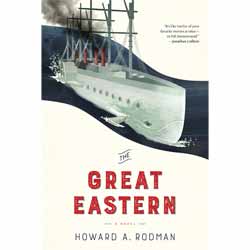|
Click here to return to the main site. Book Review
Howard A. Rodman’s brand new novel The Great Eastern is ambitious from birth on its very first page. He’s mastered the symphony of all American novels—and perhaps all novels—literati juries adjudicate incessantly. No mean feat with Herman Melville’s Moby Dick, but to syncopate it with the Zeus of all science fiction, Jules Verne, is Herculean. Rodman bench presses the seemingly impossible and plausibly lifts us into this breathless page-turner. He confers the gift of life on two of the most formative and reflective fictional personalities in a half millennia of literature, two captains of the sea, Ahab and Nemo. One seeks dominance from the surface, the other from beneath. If the ocean is deemed a metaphor for the mind, then both brain lobes, left and right, are baptized into such imagining. Rodman is clear on this. Thus his fictional characters carry the weight of abstraction we transcendently euphemize as concrete. To do this Ahab and Nemo must meet one Protagorean test and affect our whole mind with dialogical discourse, relational connectivity. I’m happy to report Rodman’s book achieves this Olympian status and greets us as with that oft-sought achievement so rarely found: The Great Novel. I would say great American novel but The Great Eastern is more than that. It’s world class. Pantheon literature. The greatest sci-fi character of history is pitted against the greatest conqueror of Nature. They are brought into mortal combat because of a factual icon of iron mightiness, Isambard Kingdom Brunel, captain of corporate enterprise. Stephen Jay Gould called him ‘the most important person in the entire nineteenth-century history of Britain.’ Brunel designed the leviathan of all iron-clad steam ships, The Great Eastern. His monster ship is unspooling the first Trans-Atlantic cable for American magnate Cyrus Field and becomes the cause of combat. Nemo hates the cable and all it represents. He is the former Prince Dakkar of India whose entire family and cultural heritage have been bloodily erased by captains of industry and Napoleons of finance from the United Kingdom. He is a victim of ‘The Company’ and the government that militates for it. Ahab, somehow a survivor from his pyric experience with the great white whale is hired by Field to protect his precious cable. Ahab is the ultimate American ‘company man.’ Nemo is his antipode. Popular renderings of Nemo soft pedal his anti-colonial motive and indeed his racial heritage. Not Rodman. His Nemo, true to Verne, is the victim of multi-national company conquest and has sworn to defeat this threatening colossus of iron indifference. It is in this motive we are reminded of Verne’s vision. Colony grief is as real now as it was then. The shackles may not be iron anymore, just compound interest on loans impossible to repay. Nemo’s mission is one of high revenge. Spiritual liberation. A new term is making the rounds these days: faction, the blend of fact and fiction. The Great Eastern is that. Of course others have delved here, Capote and Doctorow, but The Great Eastern is a Darwinian leap. The fictional characters of Ahab and Nemo converse with us in our minds, conscious and unconscious. In this Trans-Atlantic conference call, both our selves, ratiocinating and oneiric are engaged simultaneously. This is a midnight oil read. It pays homage to nineteenth-century sentence structure and vocabulary without being hoity-toity or austere. (It’s the first time this humanities drop out student has seen the term ‘borborygmus’ in awhile I can tell you that.) Rodman takes the phantasmagorical acrobatics of Verne and summersaults his vision of science fiction into science fact. In other words, we get to see how the Nautilus is constructed and how it works. There are forensics, murders, magnificent mayhem and great sorrow. All the dramatis personae spring to life and reach back into our history. It’s beautiful and it hurts. It’s impossible to read Rodman and not think of contemporaneous headlines that offshoot from our colonial hagiography, our own continued ‘subcontinental’ hegemony. In his authorial finale, his crescendo, Rodman delivers us a scenic angels view, a flyover of the aftermath, its topography of meaning. Something we must have, something the great novelist must do. The end vision swirls through the Paris Commune chaos and even bonuses us with cameos of Verne and Melville. The Great Eastern is magnificent historic science fiction engaging us with the fact of now-knowing thought—the personal oceans inside our heads. (Post script: The Great Eastern comes out of the gate with a film adaptation deal signed by London-based producer Great Point Media. Howard Rodman, former president of the Writers Guild of America, West will adapt himself - comingsoon.net). 10 John Huff Buy this item online
|
|---|


